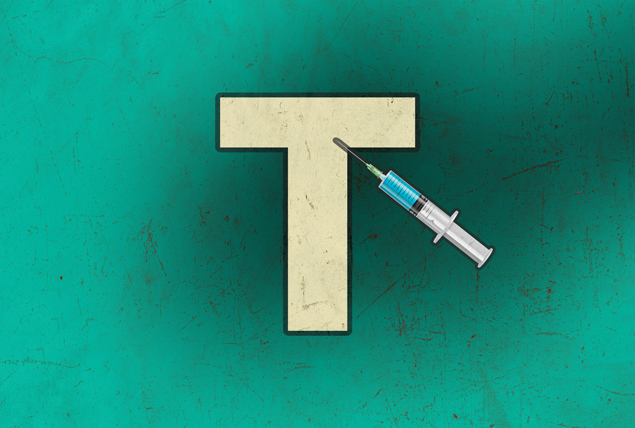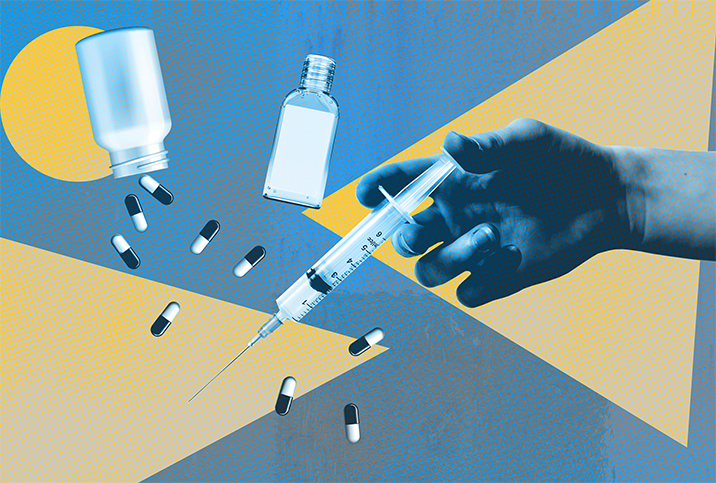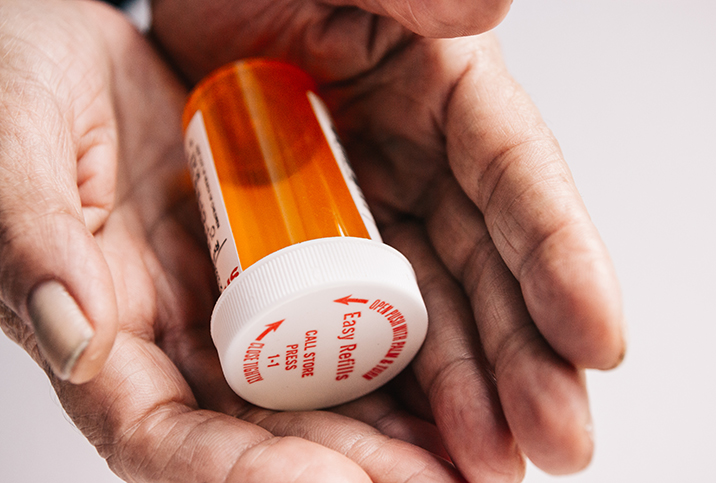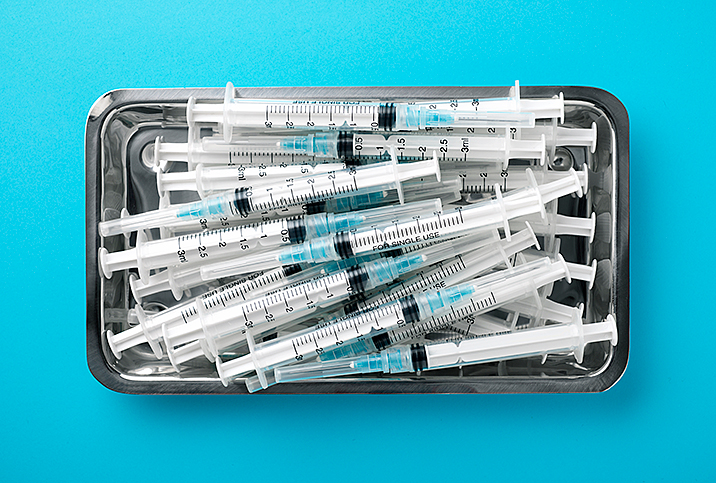Testosterone Replacement Therapy Has Pros and Cons

Human beings tend not to like bad news.
We are liable to seek out the sunniest version of events, sometimes to the exclusion of reality. When all you hear is the good, it's easy to forget about the bad and the ugly, but they're almost always hanging around.
Being subjected to endless ads, articles and videos touting the benefits of testosterone replacement therapy (TRT) may cause some men to fall victim to this phenomenon.
Make no mistake: Many people clinically diagnosed with testosterone deficiency, also known as hypogonadism or low-T, benefit from TRT. However, the eagerness to reap the benefits may gloss over some of the risks.
Let's examine the upsides people can experience from TRT, but also take an honest look at the downsides.
What is testosterone replacement therapy?
TRT is exactly what it sounds like: using testosterone via injection or a topical cream to replace a decrease in the natural production of the hormone. It's for people who have been diagnosed with testosterone deficiency, and its use must be carefully calibrated and closely monitored.
According to American Urological Association (AUA) guidelines, the diagnosis of testosterone deficiency requires two early-morning tests (when testosterone levels are highest) that confirm a total testosterone level below 300 nanograms per deciliter (ng/dL) and at least some of the following symptoms:
- Reduced sex drive
- Erectile dysfunction (ED)
- Loss of armpit and pubic hair
- Depression
- Irritability
- Difficulty concentrating
- Cognitive dysfunction
- Memory issues
- Loss of energy
- Fatigue and reduced endurance
- Decreased muscle
- Increased body fat
- Bone loss
It's important to note that several other medical conditions can cause similar symptoms, such as metabolic syndrome, diabetes, obesity, lack of exercise, a poor diet and chronic alcohol or drug use.
You should consult a trusted healthcare provider if you have concerns about your testosterone levels, because your levels may be within the normal range.
The pros of TRT
A conversation with your doctor is never a bad idea, especially when it comes to a hormone as important to your body as testosterone. TRT is not for everyone, but it is appropriate for a lot of people, and they experience many potential upsides.
Some of the common pros of TRT include a revived libido, improved mental health, increased bone density and a lowered likelihood of anemia.
Libido
Testosterone is a key component of the male sex drive. Without it, men may have trouble getting and maintaining an erection. Purveyors of testosterone usually tout these benefits.
Research suggests, however, that only men with testosterone deficiency are likely to experience an improvement in erectile function when they go on TRT. While these benefits are real and important, there is so much more to testosterone and how TRT can help.
"In terms of what we know about the benefits of TRT in erectile dysfunction and libido, yeah, those are just two of like 10 different symptoms that testosterone can benefit," said Amy Pearlman, M.D., a men's health specialist and co-founder of Prime Institute in Fort Lauderdale, Florida. "But those other symptoms are completely unrelated to the genitals."
Mental health and cognition
One area of interest in testosterone research suggests how vital proper testosterone levels are for maintaining mental health, memory, concentration and the ability to think clearly. For instance, one 2016 study found older men with testosterone deficiency demonstrated increased cognition and decreased depression when given a 24-week course of testosterone.
Bone density and anemia
As a vital hormone that humans produce throughout their lives, testosterone is important to a number of systems, including bone growth and bone density. Far from being strictly about performance in the bedroom, low testosterone in older men can contribute to an increased risk of broken bones and anemia.
"What we know, too, is it can help with anemia and bone density," Pearlman said. "Those are two things that don't usually prompt someone to see a urologist, but research suggests it can help with both of those. Testosterone really plays a role in a lot of areas outside of urology: in the primary care setting, in the endocrinology setting, in the hematology setting and more."
The cons of TRT
For all of its upsides, TRT—like any form of treatment—also has downsides. The ones you should know about are cardiovascular issues, thickening of the blood and fertility problems.
Cardiovascular issues
While low testosterone is increasingly being recognized as a risk factor for heart disease, if someone already has heart issues, putting them on TRT can cause further problems.
"In certain patient populations, putting someone on testosterone can have adverse events," Pearlman said. "The example that comes to mind is someone who has had congestive heart failure."
Hematocrit
Along with testosterone levels, TRT candidates get tested for hematocrit, the percentage of red blood cells by volume in your blood. If that level gets too high, it can cause issues.
"Testosterone therapy can also raise hematocrit levels, which is the thickness of one's blood," Pearlman said. "So if the levels get too high, it can cause someone to not feel well, to have headaches, to have flushing, to be tired, and then there is concern about increased cardiovascular risk when the hematocrit is too high as well."
Fertility
The most significant downside of TRT is that it can have a negative effect on fertility. When you start taking exogenous testosterone—that is, testosterone made outside the body—your testicles stop making it themselves. This means they usually stop or drastically reduce sperm production.
Workarounds for this exist, including freezing sperm before starting TRT or taking other drugs along with testosterone that promote sperm production. Often, though, it comes as a surprise to guys that more testosterone might mean less sperm.
"The data shows that around 60 percent of men on TRT develop what we call azoospermia, which is they have no sperm in their ejaculate," said Justin Dubin, M.D., a urologist and men's health specialist with Memorial Healthcare System in South Florida. "I'll see them in the office because they're trying to have kids, and they have no sperm in their ejaculate and they're on TRT and they'll say no one told them it causes infertility. I see it all the time in South Florida because they have all these men's health clinics."
Conclusions
TRT is a valuable therapy that helps millions of men live better lives, but the research suggests it works only for people who have a genuine deficiency.
If you have questions about your testosterone levels, talk to your doctor about getting a test done. But steer clear of tall tales about what TRT can and can't do for you.
Don't have a doctor you see regularly? You should. Don't know how to find one? Telehealth makes it easy to connect with a doctor who can answer your questions and evaluate your situation. Giddy Telehealth is an easy-to-use online portal that provides access to hundreds of healthcare professionals whose expertise covers the full scope of medical care, including men's health. Many of them offer video visits and same-day appointments.


















